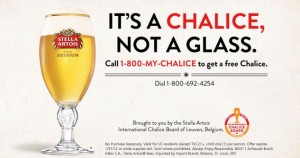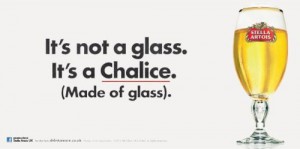Plain English Patrol 4
Having been excoriated so harshly for it a few months back, I’ve been trying to stay off the pedantry. But it’s like being an alcoholic. You take one wrong turn, see an ad on a bus shelter and suddenly the disease is back in control.
I’ve been criticised, probably rightly, for having a go at inconsequential bits of copy, or blaming the writer for what could have been the client’s call. But I really don’t think either of those applies in this case. We’re talking about a high-profile campaign, for an international brand, created by one of the most highly regarded agencies in London.
Disastrophe
The target in the Patrol’s sights is the current poster campaign for Stella Artois, which has been rolling out through 2012. By the brand’s own standards, it’s a fairly middle-of-the-road affair, featuring white backgrounds, simple product shots and relatively traditional slogans on the theme of heritage and history (although it’s ostensibly united with the ‘She is a thing of beauty’ theme). Needless to say, it’s the slogans that concern us here.
Let’s start with this:
Master Brewers required.
600 years experience needed.
The problem with this is the ‘600 years experience’. No, it’s not the question mark over whether Stella has actually been brewed for 600 years, which others have raised. And it’s not beginning a sentence with a numeral – I’m letting that go since this is ‘just’ an ad. The real issue, although almost nobody seems to observe this rule any more, is that ‘years’ needs an apostrophe: ‘600 years’ experience’.
The reason for this is that the experience ‘belongs to’ the 600 years. Another way to put it would be ‘the experience of 600 years’. When this is condensed into ‘600 years’ experience’, the apostrophe expresses this sense of possession. (Here’s a post that backs me up.)
Another way to express it would be ‘600 years of experience’, but such a construction would only ever really be written, not spoken aloud, and we’re working in a conversational tone of voice here. But we still need the apostrophe, or we’re just jamming two nouns together without clarifying how they relate to each other.
Changing the subject
Now for another example – yes, from the same campaign.
Like all works of art, one must take time to appreciate it.
(Apologies for mobile-phone photo.) Here, the issue is a confusion between subject and object caused by the subordinate clause being placed at the start of the sentence.
The subject of the main clause is not ‘it’ (Stella) but ‘one’ (the Stella drinker), so the subclause ‘like all works of art’ refers to ‘one’. The sense of the sentence is therefore ‘Because you’re like all works of art, you must take time to appreciate Stella’, which I’m fairly sure was not the intended meaning.
The line would have been better (if still technically wrong) the other way round…
One must take time to appreciate it, like all works of art.
…because that would have put the subclause nearer to ‘it’, helping to make it stick to the object rather than the subject. Aesthetically, though, that would be putting the cart before the horse by leading with the punchline.
With just a little tweak, the whole thing could have made perfect sense:
As with all works of art, one must take time to appreciate it.
Alternatively, if we wanted to keep ‘like all works of art’, we could go with:
Like all works of art, it takes time to appreciate.
But why not make the reader think a little, save some words and end on a stressed syllable (like Giles Coren always does)?
It takes time to appreciate art.
Up the bracket
Let’s have one more before they close. Have a look at this poster.
It’s not a glass.
It’s a Chalice.
(Made of glass).
I wonder how many drinkers of ‘wifebeater’ know what the word ‘chalice’ means? Leaving that burning question aside, there’s no way the word can have a capital C. It’s not a proper noun (unless we infer that it’s short for ‘Stella Artois Chalice’, maybe) and it doesn’t begin the sentence. But let’s be charitable and put it down, along with the red underlining, to graphical emphasis – even if italics might have been more orthodox, brand-appropriate and visually attractive.
No such indulgence can be extended to the punctuation in the last line. In UK English, the only time you can have a full stop outside brackets is when the brackets enclose a subclause within the sentence that’s terminated by the full stop (like this). Since the previous sentence (‘It’s a Chalice’) has already ended with a full stop, ‘Made of glass’ can’t be a subclause of it.
That leaves ‘Made of glass’ as a standalone sentence, as implied by its capital M. It doesn’t have a subject as such, but we can probably allow a few fragments in conversational English. However, if it’s a sentence, the full stop must go inside the brackets, not outside them. (Sarah Turner of Turner Ink has written a wonderfully concise post explaining these conventions.)
Here’s my ‘technically correct’ remix:
It’s not a glass.
It’s a chalice.
(Made of glass.)
This US counterpart sidesteps all these problems (apart from the capital C) with a punchier single-sentence version that’s arguably more effective. I don’t know which came first, or whether the same agency produced this one.

Who cares?
Isn’t this all ludicrously pedantic? Maybe, but the rules in each case are very clear and not difficult to learn (or Google). And if you don’t get it right for a ten-word slogan on a poster, when do you get it right?
For the sake of an extra word or punctuation mark, it has to be worth it. Short of using obsolescent constructions like ‘to whom’, which might actively confuse the reader, you don’t lose anything by having the grammar right.
Only swivel-eyed pedants like me and Lynne Truss get worked up about this stuff. But I believe everyone is aware of it to some extent, just from reading and listening to language all their lives. While small errors don’t nobble the meaning completely, they may well impair it, or create a negative impression – even if only on a subconscious level.
It does seem strange that no one involved with these ads picked up on these issues. I guess it just proves the old printer’s adage: the larger the type, the harder it is to spot the mistake.
Comments (21)
Comments are closed.




When people query the use of the apostrophe in ‘600 years’ experience’, ask them if ‘one years experience’ would look right without an apostrophe.
Good post Tom. I admit I can get tetchy at unnecessary pedantry, but in this case, I think you’re right to point out these flaws. I’d noticed the mistakes in two of these adverts in my own travels.
However, the most frustrating of the three for me has to be the ‘Chalice’ example. The capital ‘C’ looks terribly out of place and as you say, is completely unnecessary. The full-stop outside the brackets just adds salt to the wound.
With agencies of this size – you have to assume they’re making conscious decisions to defy grammatical conventions for effect. But with this cases, I’m not sure what the adverts gain for it.
I’m going to out-pedanticise (?) you now, Tom, by pointing out that there are two typos in your article.
@Nigel
I proofread it off paper as well. I’ve gone through and corrected what you may have been referring to. How did I do?
Full marks.
I believe every writer should read Bill Bryson’s ‘Troublesome Words’. If you know the basics, it’s like a finishing school for writers – precision stuff like knowing where to use ‘only’ as a moderator.
Not that the audience gives a monkey’s.
Good post, it’s always heart-warming to see other people care about the specifics of English. As an ex-English teacher, its frustrating to see the mechanics of the language neglected, especially when these pros only had a few sentences to deal with!
This reminds me of an argument I had recently over another drinks campaign (I forget whose it was) with the tag ‘Jack of all trades, master of all’, apparently suggesting that one can be both average at something and a master of it at the same time.
Your second point here reminds me of a particular bugbear. Letters that start with something along these lines: “As a valued customer, we thought you may be interested in this offer.” Sadly, this sort of heinous crime of grammar seems to be on the up. And as your previous correspondent points out, no one really gives a monkey’s.
Tom, we often see deliberate/unintentional infractions of grammar in printed ads. In fact many ads deliberately break/bend the rules of grammar to get readers’ attention. Stella Artois’ is no different. Was their infraction deliberate or unintentional? I’d say deliberate.
@Paul
Nah, they’re just thick. The UK is largely illiterate.
@Paul, Nigel
I wouldn’t go quite as far as Nigel, but I do believe these errors are unintentional.
Partly because of its unwanted laddish connotations, Stella’s whole ‘thing’ is to position the brand as something for the discerning customer, and that’s reflected in the ‘classic ad’ style of these lines.
Following on from that, the tone of voice in these ads is intelligent, wry and refined – as opposed to say, deliberately coarse, vulgar or ‘youth’ in a Pepsi Max sort of way. And the appropriate mode of expression for that tone is 100% correct English.
If your headline includes words like ‘required, ‘experience’ or ‘appreciate’, you don’t make it any more effective by introducing an error. In fact, the general positioning makes it all the more likely that the target audience will notice, and be irritated by, the errors.
In my opinion…
Unlike you, Tom, I don’t know Stella’s audience. So I defer to your local knowledge. Which means Nigel’s right, to a point. Not all the UK’s illiterate (yet). Just certain ad agencies.
I believe you are missing a rather literate cultural reference. Chalice may be a proper noun, the Holy Chalice (of the Last Supper/Holy Grail).
Personally the ad that most gets my goat for illiteracy is the one that has an English salesman crticising an American for his pronunciation of ‘aluminium’ as ‘aluminum’, saying “it has a ‘u’ in it”. Both words have two ‘u’s, it is the ‘i’ that Americans omit!
As a copy editor at an advertising agency (in the U.S.), I suggest another possibility: that the client insisted on these constructions (particularly the capital C). I once had a client who did not allow me to change “ourself” to “ourselves” because “‘ourself’ sounds better.'” Of course, the account person in this case wasn’t the type to try to save the clients from themselves (themself?), so my argument went nowhere.
And then I included an apostrophe error myself in my comment. It’s still early here–which introduces another possible cause for the errors: proofreading before coffee.
Hi Tom,
I wrote a comment on Facebook, where the SfEP included a link to this article. I wanted to copy across what I wrote there, as I’d be interested in your opinion on what I pointed out.
I was reviewing my style manual for rulings on apostrophes and expressions of time a few hours ago (for a current job). I’m an Aussie, and in our ‘Bible’, (our government’s Style Manual for writers, editors and printers), it clearly states, ‘It was previously conventional to use an apostrophe in expressions of time involving a plural reference, but it is now left out’.
So, perhaps the group who edited this were from Australia? Apparently our ‘people in the know’ only want to see an apostrophe if the time reference is in the singula?. I was also taught this at the college I got my diploma of editing (and I’ve pulled out the tutorial that quoted this too). Funnily enough, the example they provided was almost identical to the one in the article, saying ’20 years experience’, or if it is only one year, you would use the apostrophe, i.e. one year’s experience. Maybe it’s a convict thing?
In a nut shell, editors over here who consult our most respected style manual will be guided to do exactly what this ad has done. Interesting.
Oh dang. I made a mistake. I’m going to cite a similar excuse as Sheila and say, it’s getting late over here, and my morning coffee has long left my system (ha-ha). Corrections: singular and removal of the unnecessary full stop. The shame!
Just to chip in – I think it’s fine to deconstruct the grammatical errors of ad campaigns that potentially cost millions – but you should be less hard on yourselves here in the comments! It’s okay to make mistakes sometimes.
@Jennifer et al
Absolutely, let’s cut ourselves some slack. As Nigel noted above, I made two errors myself in the actual post. It’s impossible to proofread your own work…
I could live with the first three examples, but the “Chalice” concept is a train wreck. It’s just chest beating hidden inside an opaque, uninteresting concept.
Further, I’m a big fan of parenthetical statements, and as Absolute Ruler Of The Planet, I’d suggest the the person(s) responsible for the misplaced period should be hung on the billboard (I’m assuming billboards) where the period should be.
And left there for a week or two.
(No, I’m not a benevolent ruler.)
Maybe they meant to write “CHALICE!!!”
Personally, I don’t think “brewers” requires a capital “B” since it’s a general, and not specific, reference. That’s where the trouble started. 😉